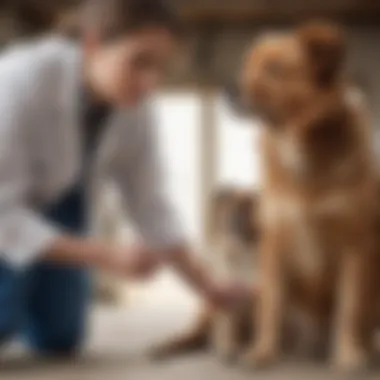What to Do If Your Dog Has Diarrhea: A Comprehensive Guide


Intro
Diarrhea in dogs can be a concerning issue for any pet owner. It's crucial to understand that this symptom can stem from various underlying causes, ranging from benign to more serious health concerns. Recognizing the signs and knowing how to respond are vital steps in ensuring the well-being of your furry companion. This comprehensive guide aims to provide pet owners with detailed insights into identifying the causes of diarrhea in dogs, assessing its severity, and implementing appropriate home care strategies or when to seek veterinary help.
By being informed, you empower yourself to tackle this troubling symptom effectively and safeguard your pet's health.
Understanding Your Pet
Breed Traits
Different dog breeds exhibit various sensitivities that can impact their digestive health. Certain breeds, like bulldogs and German shepherds, are more prone to gastrointestinal issues and might develop diarrhea more frequently compared to others. Understanding these traits specific to your dog’s breed can help you monitor their health more effectively. Pay attention to how your breed manages dietary changes and stressors, as these factors can greatly influence digestive stability.
Common Temperaments
Temperament also plays a role in how dogs react to changes in their environment or diet. A nervous dog may experience stress-induced diarrhea, while a more laid-back dog might be less likely to have such reactions. Assess how your pet’s temperament interacts with changes in routine or diet, as this insight can aid in addressing issues early on.
Special Needs
Some dogs may have special dietary needs due to health conditions or age. Older dogs or those with prior digestive disorders might require a specialized diet. If your dog has special needs, it’s vital to consult with a veterinarian on the best nutritional guidelines to avoid digestive disturbances that could result in diarrhea.
Pet Care Essentials
Nutrition and Feeding Guidelines
Diet plays a crucial role in canine gastrointestinal health. High-quality dog food formulated for your pet’s specific needs should form the basis of their diet. Monitor for any changes in digestion with new foods and introduce any dietary changes gradually to prevent potential digestive upset. If diarrhea occurs, consider a bland diet of boiled chicken and rice, which is typically easier on the stomach.
Grooming Tips and Techniques
Regular grooming is essential for your pet’s overall health, although it might not directly relate to diarrhea. Keeping your dog clean helps minimize the risk of infections, which can lead to digestive issues. Focus on cleaning up after your pet immediately, especially following bouts of diarrhea, to maintain a hygienic environment.
Health and Wellness
Annual veterinarian check-ups can catch underlying health issues before they escalate. Regular vaccinations and parasite preventatives ensure that your dog remains free from harmful diseases that can contribute to diarrhea. Maintain a close eye on your pet’s reactions to medications as some may cause gastrointestinal upset.
Training and Behavior
Basic Training Techniques
Using positive reinforcement in training can help manage your dog’s behavior during stressful situations that may lead to diarrhea. A well-trained pet feels secure and may be less prone to digestive issues linked to anxiety.
Behavioral Problems and Solutions
Addressing behavioral problems early can prevent stress-induced diarrhea. Dogs may react poorly to changes in their environment. Providing a stable routine and positive reinforcement when they remain calm can help mitigate anxiety.
Mental Stimulation Activities
Keep your dog mentally stimulated with interactive toys or training sessions. A mentally engaged pet is less likely to experience boredom-related anxiety, which in some cases can contribute to gastrointestinal discomfort.
Engaging with Your Pet
Interactive Games and Toys
Engaging your dog with various interactive games not only strengthens your bond but also helps relieve stress. Toys that encourage mental engagement can distract them from anxieties that might lead to diarrhea.
Safe Outdoor Activities
Taking your dog for regular walks or play sessions is beneficial for their physical and mental health. Ensure that your outdoor activities are safe, reducing exposure to potential stressors that may upset their stomach.


Family-Friendly Pet Interactions
Encourage family members to interact positively with your pet. A calm family environment can further reduce your dog’s anxiety levels. This stress reduction is paramount in puppies and anxious dogs who are more susceptible to gastrointestinal issues.
Pet Adoption and Integration
Choosing the Right Pet for Your Lifestyle
When considering adding a dog to your family, make certain to choose a breed and temperament that fits your lifestyle. Understanding how your choice may affect their digestive health will prepare you for potential challenges.
Preparing Your Home for a New Pet
Ensure your home is a welcoming environment for your new dog, reducing the chance of stress-induced diarrhea. Familiarize them with their space, food, and routine to foster comfort.
Tips for Smooth Preamble
When welcoming a new pet, introduce them slowly to the family and other pets. Gradual interactions help maintain a calm environment, reducing stress levels that may affect their digestion.
Learning how to manage your pet's health is an ongoing journey. Observing their habits and understanding their unique needs strengthens the pet-owner bond while ensuring optimal health.
Understanding Diarrhea in Dogs
Understanding diarrhea in dogs is a crucial first step for any pet owner. This section serves to educate dog owners about the condition, its implications, and how it can affect a dog's overall health. Knowledge about this issue allows owners to respond effectively and appropriately to their pet's needs when they occur.
Definition and Types of Diarrhea
Diarrhea is defined as an increase in the frequency and fluidity of a dog’s stool. There are several types of diarrhea, primarily categorized as:
- Acute Diarrhea: This type comes on suddenly and is typically short-lived, lasting less than two weeks. Causes can range from dietary indiscretion to infections.
- Chronic Diarrhea: When diarrhea persists for over two weeks, it is considered chronic. This could indicate underlying health issues that need professional attention.
- Hemorrhagic Diarrhea: This more severe form of diarrhea contains blood and often requires immediate veterinary intervention.
Understanding these types helps dog owners evaluate their pet's symptoms and decide the necessary course of action.
Common Symptoms to Monitor
Monitoring symptoms is important for assessing diarrhea's severity. Common symptoms include:
- Increased frequency of bowel movements
- Watery consistency of stool
- Abdominal discomfort or pain
- Flatulence
- Loss of appetite
- Dehydration signs, such as dry gums or lethargy
Keeping a close eye on these symptoms will help owners gauge their dog's condition. Early detection of abnormalities can lead to more effective treatment.
Potential Causes of Diarrhea
There are numerous factors that can lead to diarrhea in dogs. Some common causes include:
- Dietary Changes: Sudden changes in diet or the ingestion of problematic food can lead to digestive distress.
- Infections: Bacterial or viral infections can disrupt the digestive system.
- Allergies: Food allergies or sensitivities can result in gastrointestinal upset.
- Parasites: Worms or other parasites can lead to diarrhea and may present additional symptoms such as weight loss.
- Stress: Changes in the dog's environment or routine can induce stress and affect their digestive health.
Identifying the underlying cause is essential for treating diarrhea effectively.
Assessing the Severity of Diarrhea
Evaluating the severity of diarrhea in dogs is crucial for pet owners. Understanding this aspect helps determine the necessary action. Diarrhea can range from mild to severe, affecting a dog's health and comfort. Being aware of specific elements such as frequency, accompanying symptoms, and duration of diarrhea provides valuable info to assess the situation.
Frequency and Consistency
The frequency of diarrhea can indicate its severity. For instance, a single episode may not be alarming, but multiple instances within a short timeframe warrant further attention. Look for changes in consistency. Watery stools differ significantly from formed ones. Keep a close watch on your dog’s bathroom habits. Frequent, mushy, or liquid stools could mean a more significant health issue.
- Track the number of times your dog has diarrhea daily. This will help you communicate effectively with a veterinarian if needed.
- Notice changes in stool consistency. Take mental or physical notes to see if there is a pattern.


Accompanying Symptoms
Observing additional symptoms is vital when assessing diarrhea's severity. Common accompanying signs include vomiting, lethargy, and loss of appetite. These elements can suggest more serious conditions requiring immediate attention.
- Lethargy can be a sign of dehydration or infection. If your dog seems tired or uninterested in normal activities, pay close attention.
- Vomiting alongside diarrhea is concerning. It could indicate gastrointestinal issues, often leading to urgent care.
It is important to monitor these symptoms closely. They often provide insight into the possible underlying cause of diarrhea.
Duration of Symptoms
The duration of diarrhea plays a key role in assessing severity. Diarrhea lasting more than a day can lead to dehydration and electrolyte imbalances. This can harm your dog’s overall health.
- Short-term diarrhea is mostly linked to dietary indiscretion or minor infections.
- Persistent diarrhea, however, needs professional evaluation. If diarrhea continues for more than 24 hours, it is wise to contact a veterinarian.
"Early intervention for diarrhea can prevent complications, ensuring your dog's swift recovery."
Knowing whether diarrhea is a fleeting issue or part of a persistent problem enables owners to take action. Immediate care might be required based on what you observe.
Ending
Assessing the severity of diarrhea is a necessary step to protect your dog’s health. Paying attention to frequency, consistency, accompanying symptoms, and duration can guide you in making informed decisions. This vigilance is crucial for early intervention and to ensure the well-being of your furry friend.
Immediate Home Care Strategies
Immediate home care strategies are essential when a dog experiences diarrhea. They enable pet owners to manage the situation effectively before deciding if further veterinary assistance is necessary. Quick action can help minimize discomfort for the dog and potentially reduce the severity of diarrhea.
Dietary Adjustments
Prolusion of Bland Foods
Bland foods are often the first recommendation during a bout of diarrhea. Such diets are easy on the digestive system and can help stabilize the stomach. Common bland foods include boiled rice and plain, skinless chicken. They are gentle on the intestines, reducing irritation while providing necessary calories. The key characteristic of bland foods is their simplicity, making them a beneficial choice for dogs with sensitive systems. Incorporating these foods can lead to faster recovery, but it's crucial to avoid high-fat, flavorful, or seasoned options that might aggravate the condition further.
Hydration Considerations
Proper hydration is critical when managing diarrhea in dogs. Diarrhea can lead to fluid loss, which can quickly become serious. The key to hydration considerations is ensuring that your dog has constant access to clean water. Some owners may add electrolyte solutions specifically formulated for dogs to assist in replenishing lost nutrients. This is a popular choice because it addresses not just fluid loss but also helps with electrolyte balance. However, avoid offering sports drinks designed for humans, as they can contain ingredients harmful to dogs.
Prohibited Foods to Avoid
Certain foods should be strictly avoided when a dog is suffering from diarrhea. Dairy products, fatty meats, and processed foods can worsen symptoms and delay recovery. The unique feature of this approach is to prevent further irritation of the digestive tract. Therefore, keeping these foods away contributes to the dog's comfort and health during recovery. Pet owners must stay vigilant about ingredients in any treats or human food that might seem harmless but could lead to complications.
Observing and Monitoring
Keeping a Diarrhea Diary
Documenting the dog's episodes in a diarrhea diary allows owners to keep track of frequency, consistency, and related behaviors. This method is useful for identifying patterns or potential triggers behind the diarrhea. The key characteristic of keeping a diary is its simplicity and effectiveness, providing a clear log that can be shared with a veterinarian if necessary. By analyzing the details in the diary, pet owners can make informed decisions regarding treatment and monitoring.
Tracking Hydration Levels
Monitoring hydration levels is vital during a diarrhea episode. Signs of dehydration include dry gums, lethargy, and loss of skin elasticity. Owners should regularly check their dog's water intake and the condition of their skin and gums. This task is straightforward but incredibly important. Keeping track of these factors ensures that owners are aware of their dog's hydration status. If hydration levels drop significantly, seeking veterinary help becomes crucial.
Identifying Patterns and Triggers
Understanding patterns and triggers involves observing what factors may lead to diarrhea episodes. By noting specific foods, activities, or environmental changes that coincide with diarrhea, pet owners can identify possible causes. This approach is beneficial as it aids in both immediate understanding and long-term prevention. For example, if a particular food consistently leads to diarrhea, it should be removed from the dog's diet. This careful observation can significantly contribute to a dog’s overall digestive health.
When to Consult a Veterinarian
Recognizing when to seek veterinary intervention is crucial for your dog’s health. Not all cases of diarrhea are serious, but several indicators can suggest that your pet needs professional care. Timely consultation can prevent complications and promote quicker recovery. This section focuses on the important signs you should be aware of before deciding to consult a veterinarian.


Signs Indicating Urgent Care
Blood in Stool
Blood in stool can signal significant health issues. It may indicate inflammation, infections, or even life-threatening conditions. If you observe bright red or dark, tarry stools, it is vital to act quickly. Fresh blood usually suggests bleeding in the lower intestines, while dark blood may point to issues higher up in the digestive tract. The presence of blood is alarming and cannot be ignored. Seeking veterinary advice promptly can help identify the underlying cause and initiate appropriate treatment, making it a critical concern in this guide.
Signs of Dehydration
Dehydration is a serious condition that can arise from diarrhea. Dogs can lose fluids rapidly, especially when they have frequent bowel movements. Symptoms of dehydration may include sunken eyes, dry gums, lethargy, and skin that doesn’t return to its normal position when pinched. It’s crucial to monitor your dog’s water intake and overall behavior. If they show signs of dehydration, a veterinarian’s visit is necessary. This is beneficial because it allows for rehydration methods that are safe and effective, ensuring your dog's recovery.
Persistent Vomiting
Persistent vomiting often accompanies diarrhea and can worsen a dog’s condition. If your dog vomits continuously or gagging occurs, it should raise your concerns. Multiple episodes can lead to further dehydration and might indicate underlying diseases such as infections or pancreatitis. The unique feature of this symptom lies in its persistence—if the vomiting continues despite home care efforts, veterinary assistance is essential. Seeking help can prevent severe complications, making it a major consideration.
Possible Diagnostic Tests
Stool Analysis
Stool analysis is a fundamental diagnostic tool that can reveal infections, parasites, or intestinal diseases. By examining your dog's feces, veterinarians can often determine the cause of diarrhea. The key characteristic of stool analysis is its ability to quickly identify the source of the distress. It is a beneficial choice, as it allows for targeted treatment rather than guessing at possibilities. One disadvantage might be the time required for lab results, however, it is a necessary step in understanding your pet's health.
Blood Tests
Blood tests are another important diagnostic method. They can provide valuable insights into organ function, electrolytes, and the presence of infections. Elevated white blood cell count, for instance, can indicate an infection or stress in the body. This method is advantageous because it can help detect systemic issues beyond the gut. However, blood tests may require more preparation and longer wait times, as well as causing some discomfort for the dog, which is a consideration for concerned pet owners.
Imaging Procedures
Imaging procedures like X-rays or ultrasounds offer a deeper look into your dog’s internal systems. These tests can show blockages, tumors, or abnormalities in the digestive system. Their key characteristic is their ability to visualize otherwise hidden problems. They provide a broader view of your dog’s health. However, these procedures often require sedation and can be more expensive than other tests, which can be a disadvantage for some pet owners.
In summary, knowing when to consult a veterinarian is essential for your pet's health. Signs like blood in stool, dehydration, and persistent vomiting should never be overlooked. Diagnostic tests such as stool analysis, blood tests, and imaging play a vital role in identifying the underlying issues.
Preventative Measures for Future Episodes
Taking proactive steps is essential in preventing future episodes of diarrhea in dogs. This involves a thorough understanding of your dog's health and environment. Establishing several preventative measures not only promotes better digestive health but also enhances the overall wellbeing of your pet, minimizing stress for both the dog and the owner.
Regular Veterinary Check-ups
Regular veterinary visits are crucial for maintaining your dog’s health. These check-ups allow the vet to monitor your dog for any signs of health issues that can lead to diarrhea. During these visits, the veterinarian can check for common parasites, skin conditions, and other underlying health problems that might go unnoticed by the owner. Regular vaccination schedules can also be discussed. Keeping a routine of at least once a year can help catch issues early before they develop into severe problems, which could include digestive disturbances.
Vaccination and Health Protocols
Vaccinations play a vital role in preventing diseases that may cause gastrointestinal issues. Ensuring that your dog is up to date on vaccinations is not just about preventing contagious diseases. Some of these diseases can lead to diarrhea as a symptom. Discuss with your vet the appropriate vaccination schedule for your dog's age and lifestyle.
Moreover, adhering to strict health protocols reduces exposure to environments where your dog could contract infections. Ensure that your dog is not in contact with potentially sick animals and maintain proper hygiene in its living space.
Maintaining Proper Nutrition
A balanced diet is critical in preventing many health problems, including diarrhea. Each dog has specific nutritional needs based on its age, breed, size, and health condition.
- Choose High-Quality Dog Food: Select dog food that contains quality ingredients tailored to your dog’s specific needs. Avoid brands with excessive fillers and preservatives.
- Monitor Food Changes: If you decide to switch food brands or formulations, do this gradually over several days to avoid gastrointestinal upset.
- Control Treats: Be mindful of the treats you give. Overindulgence or unsuitable treats can upset your dog's stomach.
"An ounce of prevention is worth a pound of cure."
Taking these steps can keep your pet happy and healthy, ensuring many more years together.
The End
In this article, we have explored various facets of managing diarrhea in dogs, a condition that can be both alarming and distressing for pet owners. Understanding this issue is crucial for ensuring the well-being of your furry companion. By taking informed actions, you can effectively address this health challenge.
Recap of Key Actions
- Assess Severity: Pay close attention to the frequency, consistency, and duration of the diarrhea. Monitor for any accompanying symptoms that may indicate a serious issue.
- Immediate Care: Implement dietary adjustments. Offer bland foods and ensure proper hydration while avoiding foods that could further irritate the digestive system.
- Veterinary Consultation: Know when it’s necessary to seek veterinary assistance. Recognize the signs of dehydration, blood in the stool, or other persistent symptoms.
- Preventative Measures: Schedule regular check-ups with your veterinarian, keep up with vaccinations, and maintain a balanced diet to minimize future digestive issues.
"Proactive measures can prevent many health issues, ensuring a happy and healthy dog."
The Importance of Responsible Pet Care
Responsible pet care goes beyond meeting basic needs. It involves being attentive to your dog's health and recognizing symptoms that may indicate illness. Addressing diarrheal episodes swiftly minimizes potential health complications. Recognizing changes in your pet's behavior or health is essential. This not only protects your dog’s health but also enhances the bond you share with them. Additionally, staying informed about pet health issues elevates your understanding, empowering you to provide the best care possible.



